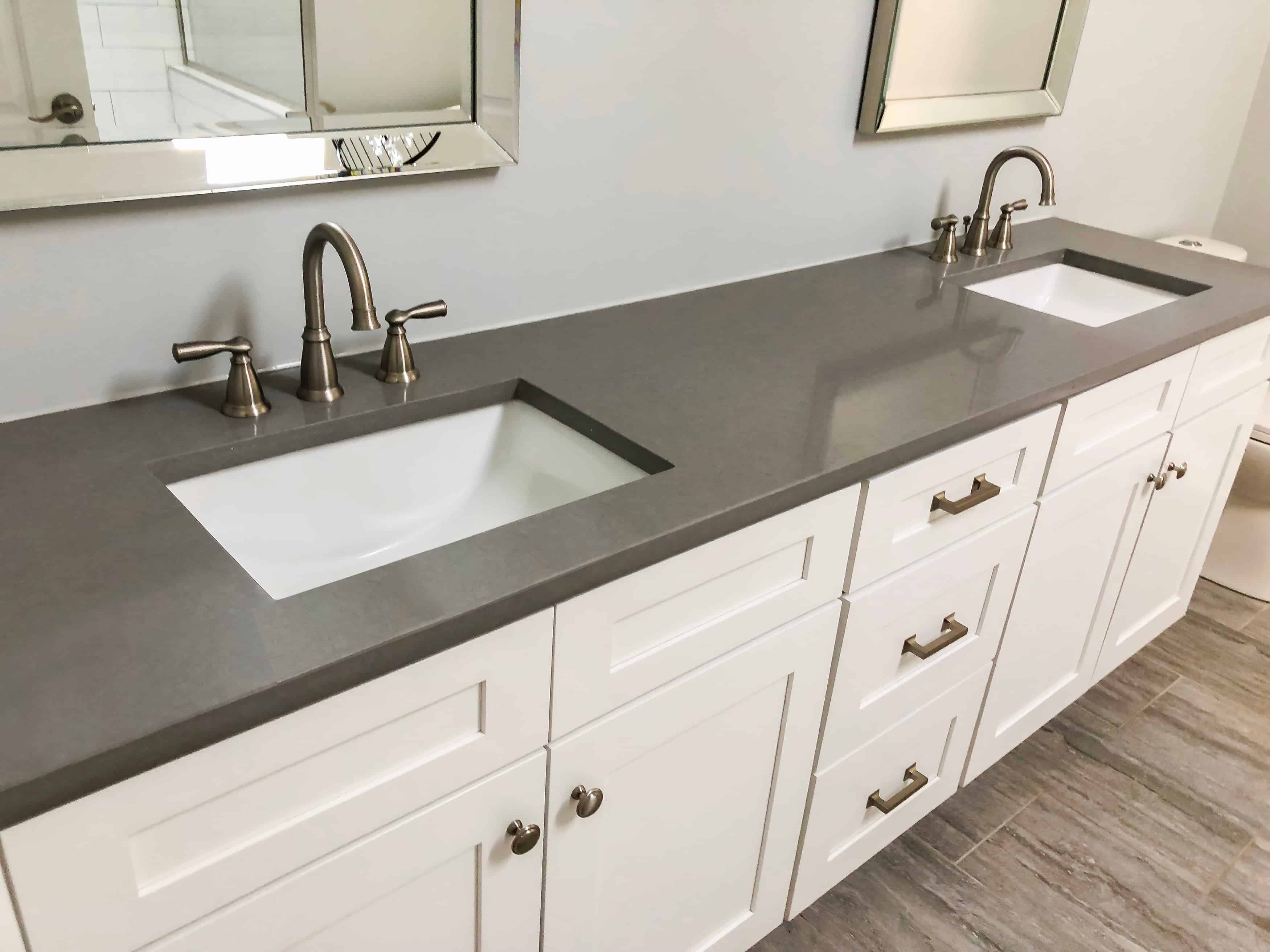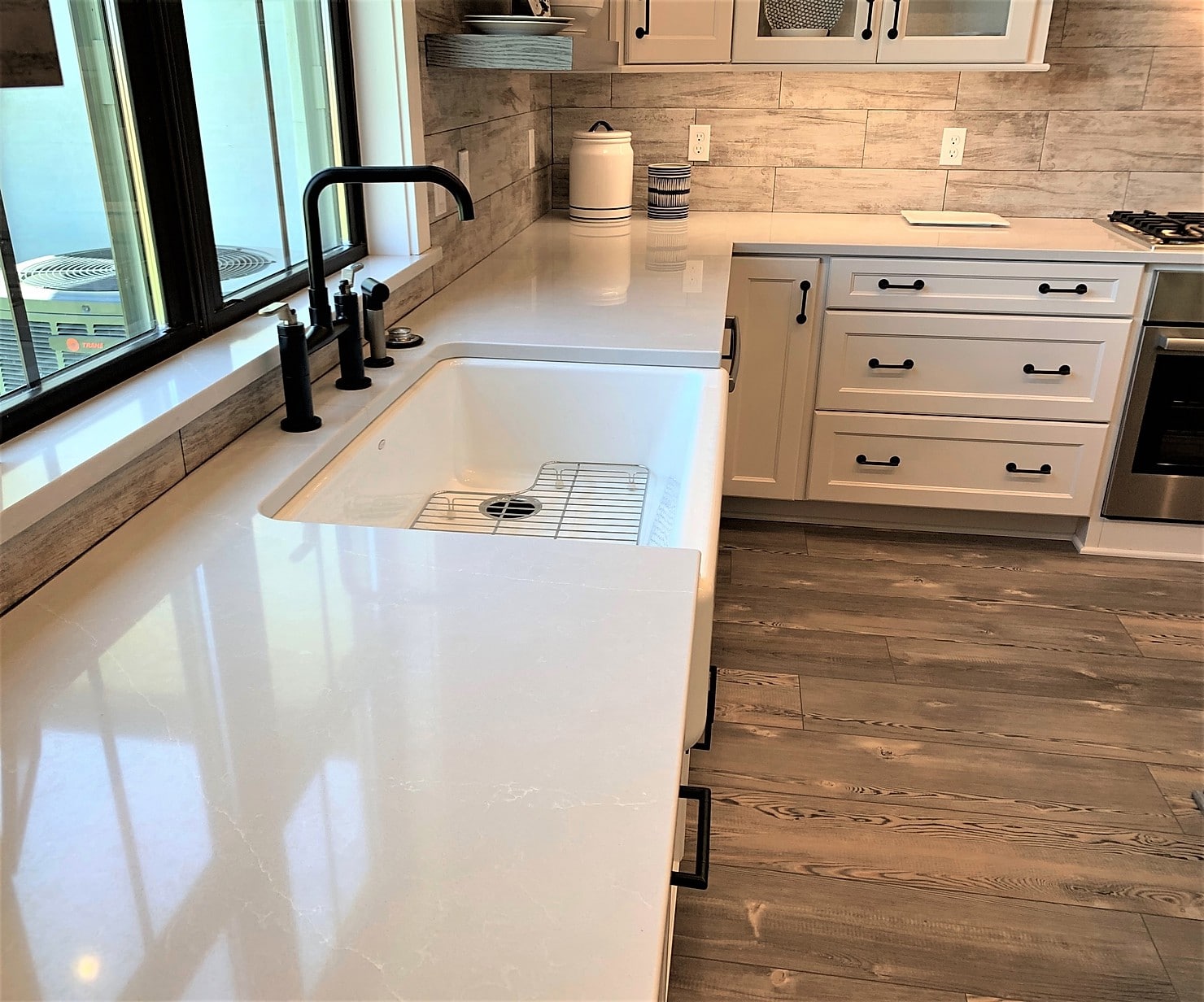Popular Bathroom Countertop Materials: What Stone Is Best For Bathroom Countertops

Choosing the right countertop material for your bathroom is an important decision. It impacts the look, feel, and functionality of your space. Here are some of the most popular options, each with its own set of pros and cons.
Comparison of Popular Bathroom Countertop Materials, What stone is best for bathroom countertops
This section will discuss the pros and cons, durability, maintenance requirements, and cost of four popular countertop materials: granite, marble, quartz, and engineered stone.
| Material | Pros | Cons | Cost |
|---|---|---|---|
| Granite |
|
|
$50-$150 per square foot |
| Marble |
|
|
$75-$200 per square foot |
| Quartz |
|
|
$60-$100 per square foot |
| Engineered Stone |
|
|
$40-$80 per square foot |
Factors to Consider When Choosing a Stone

Choosing the right stone for your bathroom countertops is a crucial decision that will impact both the functionality and aesthetics of your space. It’s important to consider various factors that align with your personal preferences and the unique characteristics of your bathroom.
Understanding Your Needs and Preferences
To make an informed decision, it’s essential to assess your needs and preferences. This involves considering your desired style, budget, and level of maintenance.
- Style: Do you prefer a classic, modern, or rustic look? The stone you choose should complement the overall design aesthetic of your bathroom.
- Budget: Stone countertops can range in price from affordable to luxurious. Determine your budget upfront to narrow down your options.
- Maintenance: Some stones require more upkeep than others. Consider your willingness to invest time and effort in cleaning and sealing your countertops.
Considering Bathroom Features
The size, lighting, and overall design aesthetic of your bathroom play a significant role in determining the best stone choice.
- Size: In smaller bathrooms, lighter-colored stones can help create a sense of spaciousness. In larger bathrooms, you have more flexibility to experiment with bolder colors and patterns.
- Lighting: Natural light can enhance the beauty of certain stones, while artificial light may require a different approach. For example, marble can look stunning in natural light, but may appear dull under fluorescent lighting.
- Design Aesthetic: The overall design of your bathroom should guide your stone selection. A modern bathroom may call for sleek, minimalist stone, while a traditional bathroom might benefit from a more ornate, patterned stone.
Visual Guide: Stone Types in Bathroom Settings
Imagine a contemporary bathroom with sleek lines and minimalist fixtures. Here, a polished black granite countertop would create a dramatic and sophisticated look. The dark hue would contrast beautifully with white or light-colored cabinetry, while the polished finish would reflect light and add a touch of elegance.
Now, envision a traditional bathroom with intricate details and warm tones. A honed travertine countertop would complement this aesthetic perfectly. Its natural variations in color and texture would create a timeless and inviting atmosphere. The honed finish would provide a soft, matte look that complements the warmth of the surrounding elements.
For a rustic bathroom, consider a rough-hewn quartzite countertop. Its rugged texture and earthy tones would create a cozy and inviting ambiance. The natural imperfections of the stone would add character and charm to the space.
Tips for Maintaining Bathroom Countertops

Maintaining bathroom countertops is essential for preserving their beauty and longevity. Understanding the unique needs of each material and implementing proper cleaning and care practices can help prevent damage and ensure your countertops remain a stylish and functional part of your bathroom for years to come.
Cleaning Bathroom Countertops
Cleaning your bathroom countertops regularly is crucial to prevent the buildup of dirt, grime, and stains. Different countertop materials require specific cleaning methods. Here are some guidelines:
- Granite and Marble: These natural stones are porous and susceptible to staining. Use a mild soap solution and a soft cloth for daily cleaning. Avoid abrasive cleaners, harsh chemicals, and acidic substances like vinegar, which can etch the surface. To remove stubborn stains, use a poultice made from baking soda and water.
- Quartz: Quartz countertops are non-porous and highly resistant to stains and scratches. You can clean them with a mild soap solution and a soft cloth. Avoid using abrasive cleaners or harsh chemicals, as they can damage the surface.
- Laminate: Laminate countertops are durable and easy to clean. Use a mild soap solution and a soft cloth for daily cleaning. Avoid using abrasive cleaners or harsh chemicals, as they can damage the surface.
Sealing Bathroom Countertops
Sealing your bathroom countertops is essential to protect them from stains and water damage. Different countertop materials require different sealing methods and frequencies.
- Granite and Marble: These natural stones are porous and require regular sealing, typically every 1-2 years. Use a sealant specifically designed for natural stone. Apply the sealant evenly and allow it to dry completely before using the countertop.
- Quartz: Quartz countertops are non-porous and do not require sealing.
- Laminate: Laminate countertops are generally sealed at the factory and do not require additional sealing.
Preventing Countertop Damage
Taking precautions can help prevent damage to your bathroom countertops.
- Use Cutting Boards: Always use a cutting board when preparing food on your countertop. This will prevent scratches and damage to the surface.
- Use Trivets or Coasters: Place hot pots, pans, or appliances on trivets or coasters to protect your countertop from heat damage.
- Clean Up Spills Immediately: Clean up spills promptly to prevent staining and damage.
- Avoid Abrasive Cleaners: Avoid using abrasive cleaners or harsh chemicals, as they can scratch or damage the surface of your countertop.
Regular Countertop Maintenance
Following a regular maintenance schedule can help keep your bathroom countertops looking their best.
- Daily Cleaning: Wipe down your countertop with a mild soap solution and a soft cloth after each use.
- Weekly Cleaning: Deep clean your countertop with a mild soap solution and a soft cloth. Pay attention to areas where dirt and grime can accumulate, such as around the sink and faucet.
- Monthly Cleaning: Use a specialized cleaner designed for your countertop material to remove any stubborn stains or buildup.
- Annual Sealing: Seal your granite and marble countertops annually to protect them from stains and water damage.
What stone is best for bathroom countertops – Choosing the right countertop material for your bathroom can be a real head-scratcher, but don’t worry, you’re not alone! Granite is a classic choice, but if you’re looking for something a little more unique, maybe consider marble or even quartz.
And while we’re on the topic of bathroom upgrades, let’s not forget about the doors! Check out this guide to best bathroom doors in India to find the perfect match for your style. Back to countertops, remember, the most important thing is to choose a material that’s both beautiful and functional for your bathroom.
After all, you’ll be spending a lot of time in there!
Choosing the right countertop for your bathroom is a big decision, like deciding whether to go with marble or granite. But honestly, the best bathroom counter material is the one that can withstand the inevitable artistic masterpieces that will inevitably appear on the stall walls.
If you want some inspiration for those masterpieces, check out best bathroom stall graffiti. Just remember, if you’re going with marble, make sure it’s sealed well, otherwise, you’ll have a permanent reminder of your bathroom’s artistic history.